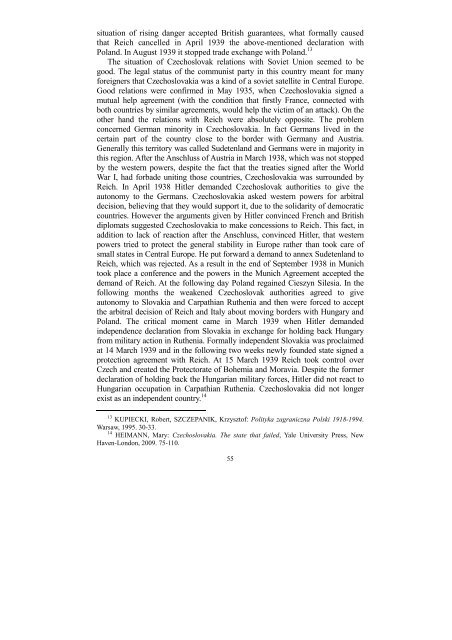The Molotov-Ribbentrop Pact - ELTE BTK Történelem Szakos Portál
The Molotov-Ribbentrop Pact - ELTE BTK Történelem Szakos Portál
The Molotov-Ribbentrop Pact - ELTE BTK Történelem Szakos Portál
You also want an ePaper? Increase the reach of your titles
YUMPU automatically turns print PDFs into web optimized ePapers that Google loves.
situation of rising danger accepted British guarantees, what formally caused<br />
that Reich cancelled in April 1939 the above-mentioned declaration with<br />
Poland. In August 1939 it stopped trade exchange with Poland. 13<br />
<strong>The</strong> situation of Czechoslovak relations with Soviet Union seemed to be<br />
good. <strong>The</strong> legal status of the communist party in this country meant for many<br />
foreigners that Czechoslovakia was a kind of a soviet satellite in Central Europe.<br />
Good relations were confirmed in May 1935, when Czechoslovakia signed a<br />
mutual help agreement (with the condition that firstly France, connected with<br />
both countries by similar agreements, would help the victim of an attack). On the<br />
other hand the relations with Reich were absolutely opposite. <strong>The</strong> problem<br />
concerned German minority in Czechoslovakia. In fact Germans lived in the<br />
certain part of the country close to the border with Germany and Austria.<br />
Generally this territory was called Sudetenland and Germans were in majority in<br />
this region. After the Anschluss of Austria in March 1938, which was not stopped<br />
by the western powers, despite the fact that the treaties signed after the World<br />
War I, had forbade uniting those countries, Czechoslovakia was surrounded by<br />
Reich. In April 1938 Hitler demanded Czechoslovak authorities to give the<br />
autonomy to the Germans. Czechoslovakia asked western powers for arbitral<br />
decision, believing that they would support it, due to the solidarity of democratic<br />
countries. However the arguments given by Hitler convinced French and British<br />
diplomats suggested Czechoslovakia to make concessions to Reich. This fact, in<br />
addition to lack of reaction after the Anschluss, convinced Hitler, that western<br />
powers tried to protect the general stability in Europe rather than took care of<br />
small states in Central Europe. He put forward a demand to annex Sudetenland to<br />
Reich, which was rejected. As a result in the end of September 1938 in Munich<br />
took place a conference and the powers in the Munich Agreement accepted the<br />
demand of Reich. At the following day Poland regained Cieszyn Silesia. In the<br />
following months the weakened Czechoslovak authorities agreed to give<br />
autonomy to Slovakia and Carpathian Ruthenia and then were forced to accept<br />
the arbitral decision of Reich and Italy about moving borders with Hungary and<br />
Poland. <strong>The</strong> critical moment came in March 1939 when Hitler demanded<br />
independence declaration from Slovakia in exchange for holding back Hungary<br />
from military action in Ruthenia. Formally independent Slovakia was proclaimed<br />
at 14 March 1939 and in the following two weeks newly founded state signed a<br />
protection agreement with Reich. At 15 March 1939 Reich took control over<br />
Czech and created the Protectorate of Bohemia and Moravia. Despite the former<br />
declaration of holding back the Hungarian military forces, Hitler did not react to<br />
Hungarian occupation in Carpathian Ruthenia. Czechoslovakia did not longer<br />
exist as an independent country. 14<br />
13<br />
KUPIECKI, Robert, SZCZEPANIK, Krzysztof: Polityka zagraniczna Polski 1918-1994.<br />
Warsaw, 1995. 30-33.<br />
14<br />
HEIMANN, Mary: Czechoslovakia. <strong>The</strong> state that failed, Yale University Press, New<br />
Haven-London, 2009. 75-110.<br />
55













